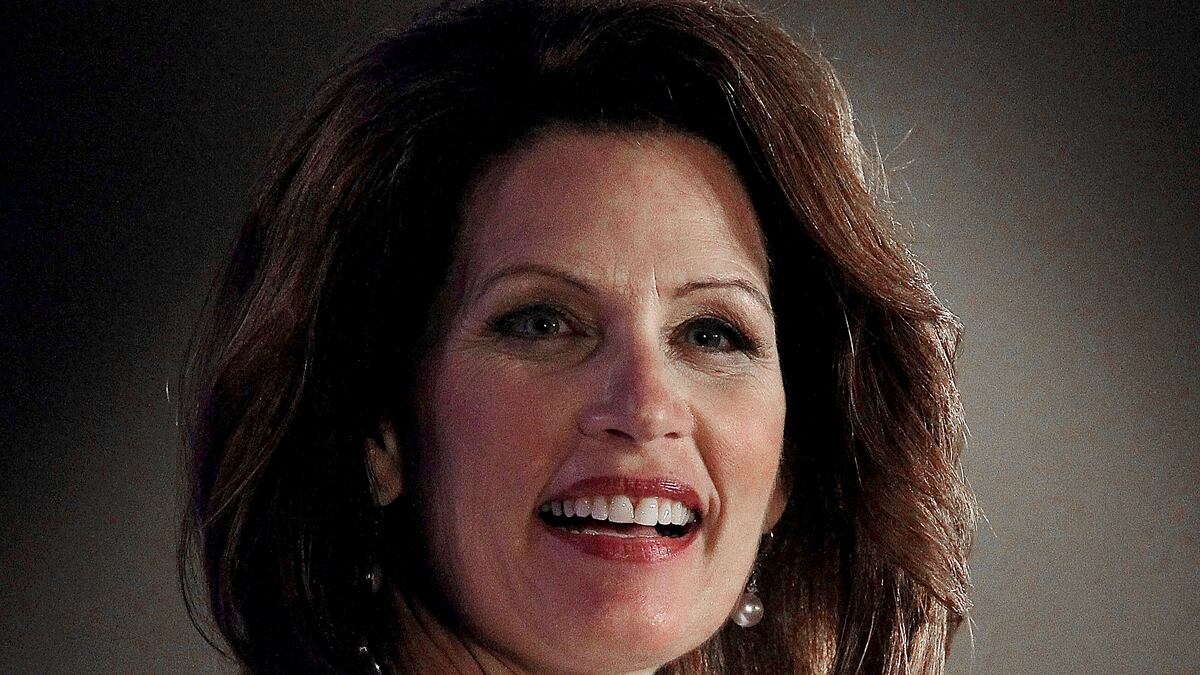She is clearly a trailblazer for women, throwing her hat into the highest ring in politics. But while Michele Bachmann became the first female presidential candidate of the 2012 campaign this week, she does not, interestingly enough, view herself as a feminist.
Unlike Sarah Palin, who has brandished the feminist moniker and spoken of an “emerging conservative feminist identity,” Bachmann told me in an interview Tuesday that she wouldn’t call herself a feminist—instead, she simply described herself as “pro-woman and pro-man.” When I pressed her on the matter, the Minnesota congresswoman said she sees herself as an “empowered American.”
Bachmann seemed loath to engage in the kind of girl-power rhetoric utilized by Palin and Hillary Clinton, who both invoked the perennial—and so far unbreakable—presidential glass ceiling.
Said Bachmann: “I’m a woman comfortable in her own skin. I grew up with three brothers. My parents didn’t see us [as] limited [by gender]. I would mow the lawn and take out the trash; I was making my own fishing lures. I went along with everything the boys did.”
Bachmann is still doing everything the boys do, but as a female candidate she endures indignities that are foreign to your average male pol. Yet she takes it all in stride.
In a joint interview with Bachmann last year, then-Sen. Arlen Specter lectured her to “act like a [lady]” when she strenuously disagreed with him on a point. A recent Rolling Stone diatribe by Matt Taibbi called her “completely batshit crazy” with a “retro-Stepford image.” MSNBC’s Chris Matthews has accused her of being “hypnotized” on the air and has referred to the three-term House member and former tax attorney as a “balloon head.”
And over the weekend, Fox News Sunday host Chris Wallace asked Bachmann if she was a “flake.” She was not pleased. “It seemed very insulting,” she told me. “But he did give me a call and he did offer me an apology.” (Wallace also posted a video apologizing and explaining why he asked the question.)

As for Matthews, she has received no apologies, but she is unfazed. Unlike Palin, who frequently decries the “lamestream media,” Bachmann doesn’t attack the attackers. “The media is what the media is,” she says. “It’s part of the territory. A person has to accept that there are difficult questions and unfair questions and it is a part of this process and it is what it is.”
While Bachmann was dismissed by much of the punditocracy before turning in a top-notch performance in the CNN debate this month and snagging a second-place spot in a recent Iowa poll, there is no clear explanation for why she has been overlooked or underestimated—at least, not if you’ve spent any time with her.
True, the media have a field day playing up her every misstep—most recently her assertion that the Founding Fathers “worked tirelessly” to end slavery—but we should know by now what that is about. (Hint: She’s a woman with presidential aspirations.) If Joe Biden’s gaffes had received half the attention of Bachmann’s, nobody would take him seriously, either.
In person, Bachmann seems eerily disconnected from the TV caricature. She is bright, quick, charming, and thoughtful. She will civilly and gamely debate any issue.
In a time when people are so tired of the shenanigans of the political parties, Bachmann calls herself “post-partisan.” She blames both parties for the mess the country is in. She identifies with the Republican Party as a conservative, but she isn’t going to carry water for its members or make excuses for their reckless spending.
When the Iowa native speaks of her childhood, which involved hardship, she is devoid of self-pity. After her parents divorced when she was 13, her family had little money, and she used babysitting proceeds to buy her own clothes. She told me that she was thankful that her family didn’t have money and she had to work her way through college because it taught her the importance of hard work and the value of the dollar.
In a conversation last year, she marveled to me that Democrats were bragging that their health-care plan allows parents to keep their kids on their health-care plans until age 26. “Why would any parent want their kid on their health-care plan when they are 26?” she asked. “Parents want their kids to grow up and take care of themselves. A 26-year-old is an adult.”
Bold words in today’s culture of eternal adolescence.
In late 2010, when conservative pundit S.E. Cupp told CNN’s Larry King that she thought Bachmann should run for president, the panel erupted in giggles. King was puzzled: “Are you kidding or do you mean that?”
Nobody should be laughing now.






